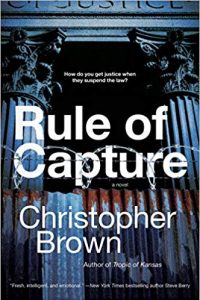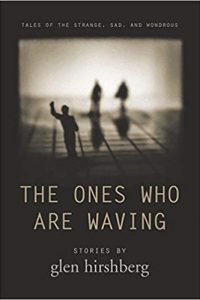Russell Letson Reviews Rule of Capture by Christopher Brown
 Rule of Capture, Christopher Brown (Harper Voyager 978-0-06-285909-9, $15.99, 378pp, tp) August 2019.
Rule of Capture, Christopher Brown (Harper Voyager 978-0-06-285909-9, $15.99, 378pp, tp) August 2019.
Christopher Brown’s second novel, Rule of Capture, is a kind of companion piece to his first, Tropic of Kansas, but not really a prequel. Tropic of Kansas (a finalist for the John W. Campbell Award) takes place in a fractured, alternate-near-future America hammered by climate change and civil disorder. Rule of Capture shows how we could get to that condition in our own timeline. Where Tropic of Kansas is a road/pursuit story – comparisons to Cormac McCarthy were not unheard of – Rule of Capture is something interestingly different: a noirish, city-bound thriller/courtroom drama set in a world just the other side of some not-improbable natural and political disasters.
The back cover blurbs beat me to the easy comparisons by invoking not only 1984 (brutal, language-bending authoritarian government) but Better Call Saul (marginal, rule-bending lawyer protagonist). I also found myself thinking of the historical intrigue novels of Alan Furst and Philip Kerr, set in the pathological political-social world of Nazis and spies and resistance fighters and collaborators. Rule of Capture fits right into that dark tradition, though its events are coming at us head-on rather than receding in the rear-view mirror. On the traditional science-fictional side, Pohl & Kornbluth’s The Space Merchants and Heinlein’s “‘If This Goes On – “‘ came to mind, for different reasons, along with Sinclair Lewis’s It Can’t Happen Here.
After a humiliating military defeat at the hands of China and a series of devastating climate-change-induced droughts, superstorms, and toxic spills, the US has suffered “the obliteration of the American narrative” and is a much-diminished power in the world:
Defeat meant the end of empire. Economic sanctions, scarcity where there had been abundance, more people fighting over the less that was left. The rich hoarded what they had won in the years before, hiding in gated communities and shell companies guarded by privatized police and smart lawyers. The more irrelevant the American flag became in a time of worldwide crisis, the more some people started to wave it… trying to conjure the return of a past that had never really been.
The nation’s rich and powerful tighten their grip on power with surveillance, censorship, concentration camps, and a legal system tweaked to allow them to treat opponents as terrorists. We get a close-up look at the machinery that is grinding up democracy from the viewpoint of Donny Kimoe, a one-time promising associate in a Houston law firm where he had “found himself defending war criminals as his employer’s idea of charity.” But Donny showed insufficient enthusiasm for the increasingly dire treatment of anyone the current corporate-governmental complex sees as a threat or even an inconvenience, and he has wound up as a kind of public defender of the system’s victims. His newest client, Xelina Rocafuerte, is doubly inconvenient, as an independent journalist sympathetic to anti-government activists and as the possessor of evidence that a disappeared opposition politician was murdered by pro-government vigilantes.
Donny is a stubborn, smart-mouth, stimulant-popping, authority-tweaking, rule-stretching, line-overstepping terrier in a fraying suit, too quixotically devoted to his clients to heed the counsel of prudence offered by more cautious, less idealistic colleagues. The story is built around a series of court appearances and related official meetings (and a couple of detentions and roughings-up), into which are interwoven encounters with the unofficial side of things: bribable functionaries, behind-the-scenes fixers, whistle-blowers, underground activists, and his favorite drug dealer. On the official side, Donny repeatedly risks his own safety when he challenges the combination of kangaroo-court and backroom brass-knuckle practices that the government deploys against its opponents. On the private side there are corporate security thugs and winked-at vigilantes to contend with, as well as his client’s unwise anti-establishment friends who reject the modest practical advice Donny gives them. Not that everyone is completely corrupt or cowardly – even the grumpy Establishment judge who was once a senior partner in Donny’s firm can be turned aside from automatic forelock-tugging, given a strong enough legal argument and sufficiently outrageous evidence of governmental misdeeds.
Donny has two MacGuffins to pursue. The first is the unconfiscated remnant of Xelina’s video footage of the murder, which would expose the killers and their connection to the Powers That Be. The second is a weaponizable legal theory that might bring down, or at least slow down, the Establishment steamroller. Donny doesn’t so much pursue this theory as build it in a series of increasingly desperate arguments, appeals, objections, and briefs aimed at freeing Xelina. While that legal challenge is a-building, Donny has to burrow through layers of official secrecy, corporate greed, old-boy network connections, bolshy resistance activists, and his own disorderly life.
The outcome is not quite what one expects, though it is telegraphed right at the start of the book, and the finale is where the nightmare really starts – not that the whole book isn’t one long scary dream disguised as an entertainment. And entertaining it is – sharply observed, tightly written, bitterly funny, with the underlying tang of unpleasant truth. The rigged game that Donny faces and the attitudes behind it are not whole-cloth inventions but extrapolations, and the legal angles are worked out as carefully as the orbital mechanics or engineering problems in a hard-SF novel: civil rights and judicial procedures eroded by captured courts and “emergency” measures; corporations taking on governmental powers, with the consent of the politicians; private security forces and prisons; a nation led by power-grab and oligarchy. The references to a contested national election and the character of the “winner” are enough to suggest how close to the bone Brown gets.
He tried to get inside the head of the President. It was a scary place, the mind of a person who thinks they should be able to exercise power over everyone else, including the power of life or death – a power whose exercise was guided entirely by the self-interest of one man.
I was reading the book on the anniversary of the publication of 1984, with the cable-news channels tracking the progress of authoritarian neo-nationalist regimes across what used to be called the Free World (not to say closer to home), and I found myself looking for clues to how near this near future might be, and rather hoping that I would be safely dead before its particular flock of chickens came home to roost. (I comforted myself with a nice Alan Furst novel about occupied Paris.) Meanwhile, put this one on the shelf next to Orwell and John Barnes’ Daybreak sequence, Ken MacLeod’s The Execution Channel, and the rest of your uncomfortable-thrillers collection.
Russell Letson, Contributing Editor, is a not-quite-retired freelance writer living in St. Cloud, Minnesota. He has been loitering around the SF world since childhood and been writing about it since his long-ago grad school days. In between, he published a good bit of business-technology and music journalism. He is still working on a book about Hawaiian slack key guitar.
This review and more like it in the August 2019 issue of Locus.
 While you are here, please take a moment to support Locus with a one-time or recurring donation. We rely on reader donations to keep the magazine and site going, and would like to keep the site paywall free, but WE NEED YOUR FINANCIAL SUPPORT to continue quality coverage of the science fiction and fantasy field.
While you are here, please take a moment to support Locus with a one-time or recurring donation. We rely on reader donations to keep the magazine and site going, and would like to keep the site paywall free, but WE NEED YOUR FINANCIAL SUPPORT to continue quality coverage of the science fiction and fantasy field.





Science fiction has a long history of extrapolating trends into an imagined future just as they hit the top of their exponential phase and S-curve over into stability.
Aircraft speeds, for example; if they’d continued the curve of 1920-1960, we’d have faster than light by now. Instead they’re almost exactly the same in 2019 as they were when I flew into Nairobi in 1964 on a British Overseas Airways Corporation jet.
The same applies to social and political trends, because “if this goes on” runs into the problem that “this” generally -doesn’t- go on. Somehow the apocalypse never arrives.
“1984” summed up classic Marxist-Leninist-Stalinist-National Socialist totalitarianism and projected it onto an eternal boot-in-the-face future just as that political phenomenon was topping out and reaching a dead end, caught in its own “internal contradictions”.
It turned out to be unsustainable (*) — as soon as Stalin died and Beria was shot, the victors started closing down most of the Gulag and beginning the transition from mass terror to a nasty but common-or-garden, increasingly corrupt oligarchic authoritarianism with increasingly meaningless ideological trimmings, which then ossified until it shattered at a touch.
Jerry Pournelle and I were working on outlining a WWIII novel when the Soviet Union collapsed: one reason it took so long was that Jerry was very insistent that the Soviet system was essentially invulnerable to internal stresses. I thought the iron giant was now mostly rust, but he’d spent his entire adult life in the Cold War, and was committed to viewing it as an infinitely powerful mega-monster.
(This was when I decided to stick to alternate history.)
I strongly suspect a lot of people — the book that’s the subject of this review for example — are doing something similar with the “rise of China” narrative. As usual, SF is becoming obsessed with extrapolating a phenomenon just when it’s topping out.
Take a look at the underlying factors — demographics most significantly.
What we’re actually seeing with China is the birth of a nation with a shrinking population, where only the retired geezers, are a growing segment, trapped in a political system which has reached the end of its utility but can’t be overthrown as yet, about to hit with its Breshnevian “era of stagnation”, dangerous mainly because of a tendency to lash out as the awareness that it’s trapped grows.
(As an aside, remember all those Japan-takes-over-the-world thrillers from the 1980’s?)
India, now… India has real potential to be a major player in the 2050’s. China, not so much, because the Han have effectively made a collective decision in favor of auto-genocide.
Further, wise SF authors should avoid being topical.
If you’re hot and cool and catch the anxieties of the zeitgeist perfectly… you date, and you get dated really, really fast and badly — like a 1980’s hairstyle or a Miami Vice stubble-beard.
Science fiction is invincibly bad at predicting the future, even worse than professional ‘futurists’, because the forces of confirmation bias and motivated reasoning and identity-protective cognition overpower the mind of anyone who tries. Or to put it another way, hope and fear are strong emotions… and strong emotion makes you stupid.
(*) High Stalinism was -literally- unsustainable: Stalin had his census officials shot, because they revealed that the USSR’s population was declining due to his terror-famines and dislocations of everyday life.